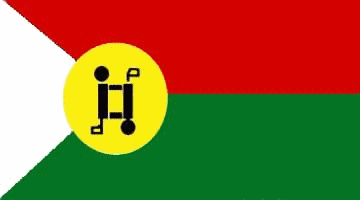 klaus-michael schneider
klaus-michael schneider
Keywords: narino | arboleda | berruecos |
Links: FOTW homepage | search | disclaimer and copyright | write us | mirrors

Last modified: 2021-08-26 by  klaus-michael schneider
klaus-michael schneider
Keywords: narino | arboleda | berruecos |
Links: FOTW homepage |
search |
disclaimer and copyright |
write us |
mirrors

image resized from municipal
web site
See also:
Arboleda (a.k.a Arboleda - Berruecos) is a municipality in the
Nariño Department. It was founded on 13 September 1859 by Jaime
Montero and named after General Julio Arboleda, the short-time
president of the Grenadine Confederation.
Berruecos is the main town of this municipality.
The flag of Arboleda is horizontally divided red over green with
white triangle at the hoist. The flag is charged with yellow disk
with black extract from the local "Piedra del Sol"
(Stone of the Sun, see <miberruecos.googlepages.com>).
Source: municipal
web site
Dov Gutterman and Felipe Carrillo, 12 August
2008
Translated from municipal
web site:
"Scarlet red. Arboleda is an historic municipalities, while
characters of national interest died in its mountains. The
poet-soldier Julio Arboleda and the great Marshal Antonio José
Sucre, as well as our ancestors, were very fiercy, taking part to
the 1000 Days' War and the conflict with Peru.
Grassland green: Arboleda is a green field, its vegetation
represents aspiration to a better future for the villagers;
Arboleda is mostly an agricultural municipality.
White: Arboleda works hard for peace and safe customs.
Golden circle with inverted symbols: inspired by our "Stone
of the Sun" archeologic reserve that identifies us. For the
Sindaguas, the inverted monkeys represent the duyality between
good and evil, feminine and masculine."
Julio Arboleda (1817-1862), lawyer and soldier, was President of
the Grenadine Confederation (Colombia + Panamá) from 10 June to
18 July 1861. He was murdered by three rascals in Berruecos on 13
November 1862.
Antonio José de Sucre (1795-1830) joined Simón Bolívar, won
the battle of Pichincha on 24 May 1822, which was the first step
to the liberation of Quito. Sucre won the battle of Junin on 6
August 1824 and the battle of Ayacucho on 9 Decembre 1824,
capturing most of the Spanish officers and the Vice-Roy and
securing the independence ofthe Spanish colonies. Elected
President for life in Bolivia in 1826, Bolivar resigned in 1828,
was elected President of Colombia and eventually murdered in
Berruecos.
The conflict between Colombia and Peru took place in 1828-1829
The 1000 Days' War is the civil war that took place in Colombia
in 1899-1900 and caused the secession of Panamá.
The Sindaguas were the first settlers of the region. The Stone of
the Sun and the Stone of the She-Monkeys are characteristic of
the cosmic vision of the Pre-Colombian cultures. The Stones were
later reused as Christian symbols.
Ivan Sache, 27 August 2008
narar.jpg)
image from municipal
web site